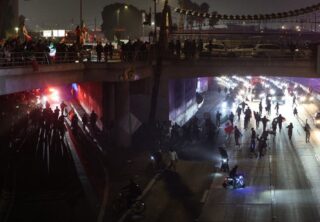CITY OF SAN FERNANDO— Tarlac officials are seeking the help of the Canadian Embassy in Manila to get rid of more than 100 cargo containers of trash imported from Canada by returning these to their port of origin, according to a top official of the province.
“Canada should be a partner in stopping the dumping of foreign wastes in the Philippines,” said Vice Gov. Enrique Cojuangco Jr. after his testimony at a hearing of the Senate committee on environment and natural resources last week.
Cojuangco said he suspected that a syndicate had been smuggling foreign wastes into the country and that the 103 containers were merely the tip of the iceberg.
At least 26 of the containers had been emptied and their contents buried in a private sanitary landfill operated by Metro Clark Waste Management Corp. (MCWMC) in Sitio Kalangitan in Capas town since June.
Rufo Colayco, MCWMC president, said the 23 containers of Canadian trash were the first batch of foreign wastes that the company accepted.
He said the disposal contract came from the Bureau of Customs (BOC) that acted on orders of a regional trial court in Manila. The court allowed the cargo mover, Le Soleil, and its foreign partner to recover 35 containers in April.
Cojuangco has helped residents of Bamban town legislate a local law banning the transport of wastes to Kalangitan. Bamban has become the alternate route to the landfill after Capas closed a road as it demanded tax payments and road maintenance.
On July 16, the Tarlac provincial board passed two resolutions prohibiting the dumping of foreign wastes anywhere in Tarlac and demanding MCWMC to end its disposal deal with BOC. MCWMC has complied with the latter.
Colayco said Gov. Victor Yap and the Department of Environment and Natural Resources had not issued a cease-and-desist order against the operation of the landfill.
At least 55 local governments in Luzon, 360 companies and 180 housing units based in the Clark Freeport, five locators at Trust International Paper Corp. complex in Mabalacat City, 125 industrial clients and 80 percent of hospitals in Central Luzon dump their trash in Kalangitan. Tonette Orejas, Inquirer Central Luzon



